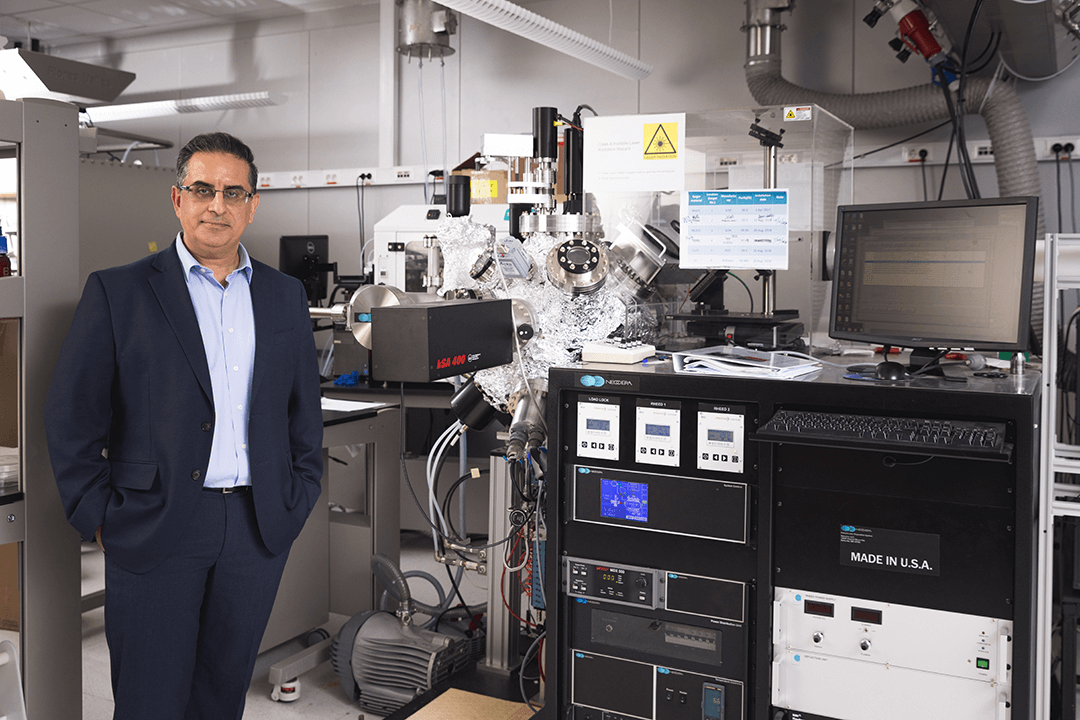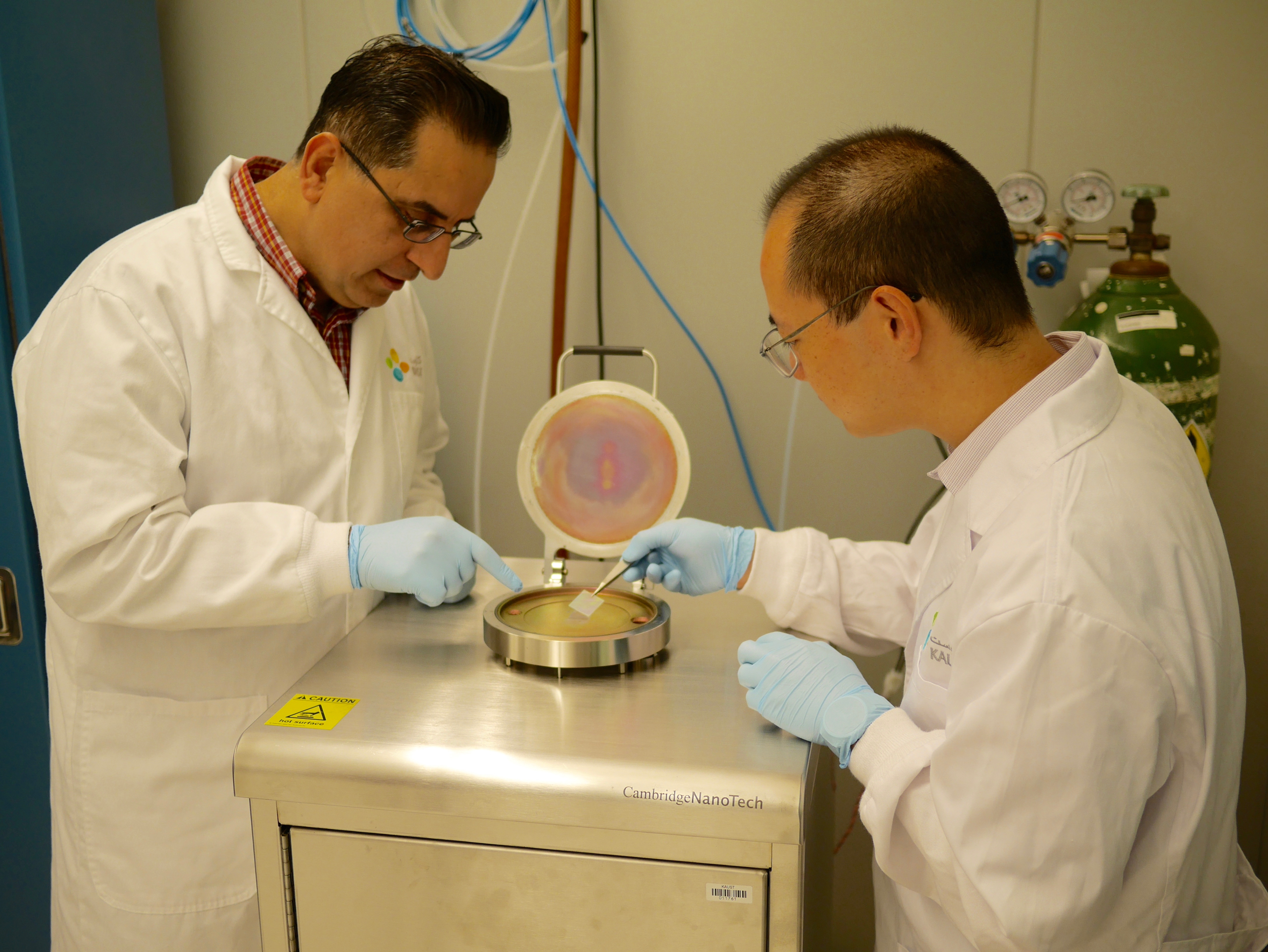Professor Husam Alshareef named Institute of Physics fellow

Portrait of Husam Alshareef, KAUST professor of materials science and engineering, in the KAUST Functional Nanomaterials & Devices Laboratory. Photo: KAUST
Dr. Husam N. Alshareef, KAUST professor of materials science and engineering, has been elected a Fellow of the Institute of Physics (FInstP). FInstP is the highest membership level attainable within the Institute of Physics (IOP) in recognition of a Fellow's accomplishments in physics and impacts made in their sector.
The IOP is an international society that fosters the advancement of knowledge, community, career development, and professional recognition for its members. It aims to bring together, inspire, guide, represent and celebrate all those who share a passion for physics.
Of his election, Alshareef said, "It is always a great feeling to be recognized by peers for having made significant contributions in our respective fields of specialization. It is a source of pride, not only for fellows but also for their groups, including students and research staff, as well as the institution."
Alshareef attributes the recognition in large part to work that he and his team have been doing at KAUST.
"I want to thank the university for its excellent support, and my group members for their tireless efforts and important contributions."

KAUST Professor Husam Alshareef (left) works in his Functional Nanomaterials & Devices research group's lab with former student Zhenwei Wang (Ph.D. '18). The group focuses on developing semiconductor nanomaterials for wide-ranging applications. Photo: KAUST
Alshareef is the principal investigator of the KAUST Functional Nanomaterials & Devices Laboratory, with a research focus on developing nanoscale materials for electronics and energy applications. His group is engaged in the synthesis of advanced nanomaterials with an increasing focus on their practical applications for the Kingdom of Saudi Arabia.
"Vision 2030 aims to localize important industries such as electronics and to grow the contribution of renewables to the energy mix of Saudi Arabia, and our groups's research aligns well with this strategy," he said.
Global recognitions
Alshareef's IOP Fellow recognition is evidenced by a series of esteemed acknowledgments in recent years.
In 2019 he was elected as a Fellow of the American Physical Society (APS) for contributions to the development of semiconductor materials and processes for electronics and energy applications, including deployment in volume production," according to an APS statement.
In 2018, Alshareef won the Kuwait Prize in the category of Clean and Sustainable Energy Technologies for scientific contributions in the area of energy storage. Such work included the development of electrochemical capacitors and batteries. For this prize, established in 1979 by the Kuwait Foundation for the Advancement of Sciences (KFAS) he received the endorsement of His Highness Sheikh Sabah Al-Ahmad Al-Jaber Al-Sabah, the late Emir of the State of Kuwait and Chairman of the KFAS Board of Directors.
In 2018 he was also named a Fellow of the Royal Society of Chemistry.
He has also been on the list of highly-cited researchers in material science (by Web of Science) for the past few years, which places him in the top 1% of materials researchers worldwide in terms of research productivity.
An unwavering passion
"I got interested in materials early in my life because my family was in the ceramics business," Alshareef said.
His studies at Alfred University and North Carolina State University in the United States ultimately led him to his current research interests in developing nanomaterials for electronics and energy applications.
"Physics, especially materials physics, has always fascinated me," he said. "I got interested in semiconductor materials, which are governed by a beautiful theory that underpins their many exciting properties. Applications that rely on semiconductor material physics have transformed the way we live; they are in everything, from electronics to photonics to communication … the list goes on."
KAUST professor Alshareef holds a flexible integrated circuit fabricated using oxide semiconductors on SABIC polymer substrates. Photo: KAUST
Alshareef's innovative research continues. He is currently working on the electronic and optical applications of a new class of two-dimensional inorganic compounds called MXenes.
He said that what makes MXenes interesting to researchers is the potential to experiment with hundreds of possible arrangements between transition metals, carbon, and nitrogen, with equally varied and promising applications in areas including battery technology and energy storage; desalination and wastewater treatment; conductive coatings, sensors and "chemical noses", and implantable nanogenerators.
"Materials play a critical role in so many fields. They are the common denominator in a wide variety of applications," he said. "In addition to developing materials for both electronic and energy storage applications, we also provide them for colleagues who work in other disciplines such as solar cells, water, and catalysis."
Looking ahead — alongside his new duties as a Fellow of the Institute of Physics, Alshareef said that his ambition is that these material technologies will play a part in supporting the Kingdom along its path of transformative economic and social reforms.

